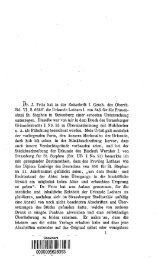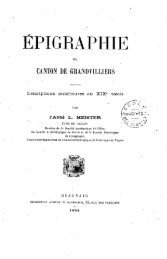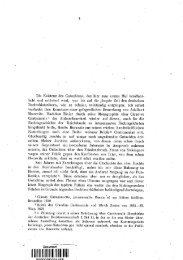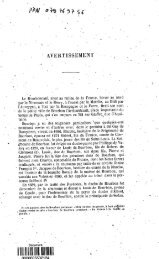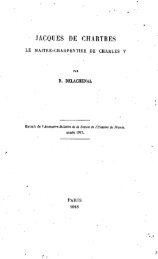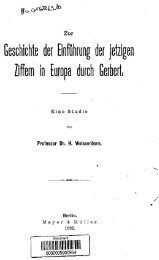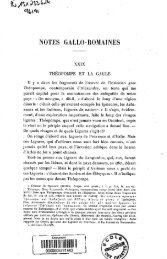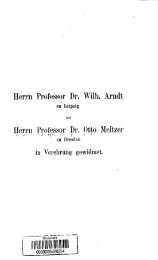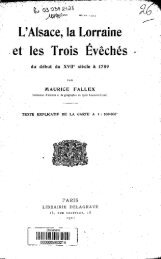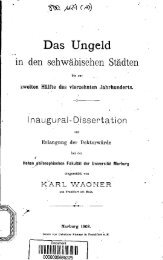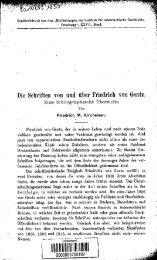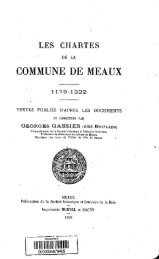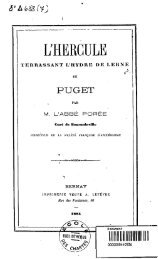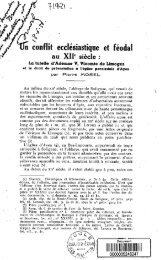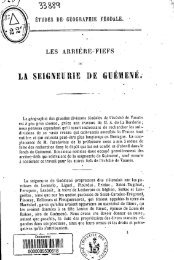4P Li gç(' TRANSACTIONS
4P Li gç(' TRANSACTIONS
4P Li gç(' TRANSACTIONS
Create successful ePaper yourself
Turn your PDF publications into a flip-book with our unique Google optimized e-Paper software.
790 LE LIVRE DE YCONOMIQIJE D'ARISTOTE [TRANS. AMER. PHIL. SOC.<br />
Norman cleric is found in a registry of twenty students<br />
of theology admitted to the College of Navarre in Paris<br />
in 1348. The presence of his family name among the<br />
inhabitants of the city of Caen in the early eighteenth<br />
century supports the assumption that Nicole was born<br />
in that vicinity; conjecturally, the (late of his birth is<br />
given as 1323. The College of Navarre admitted students<br />
only upon proof of their inability to pay their<br />
expenses at the University, of Paris, of which it was at<br />
that time the most famous and most respected adjunct.<br />
From this fact it has been concluded that Oresme came<br />
from one of those peasant families whose Sons have frequentl)<br />
, attained high honors in the annals of French<br />
scholarship. In Paris he ma y have attended the lectures<br />
of Jean Buridan; there is a reference to Oresme<br />
in Buridan's Quaestiones surer tres libros Moth eorurn<br />
in connection with the observation of a parahelion. In<br />
any case, Oresnie's contribution to natural philosophy<br />
appears as a continuation and an intensification of<br />
Buridan's speculations on scientific theory.<br />
Oresme received the doctorate in 1356 and was at<br />
once appointed grand master of his college. There is a<br />
persistent legend that during his incumbency at Navarre<br />
he was a précepteur or tutor of the future Charles V.<br />
Certain it is that he already enjoyed the confidence of<br />
Charles' father, the unfortunate John II, at whose command<br />
he wrote iii 1356 his justly celebrated treatise—<br />
probably one of his earliest—Do mufafionibus nioneforum,<br />
later turned into French under the title Traictie<br />
des ntonnoiCs. Until recent investigation revealed the<br />
true significance of his other works, it was largely because<br />
of this treatise that Ores nie's name was preserved<br />
trom oblivion. It is in this work attacking the practice<br />
of debasing the currency that Oresnie anticipates Gresham's<br />
law—that bad money drives good money out of<br />
circulation.<br />
In 1359 Oresme signed an act of the Chambre des<br />
Coniptes with the title "secrétaire du roy." At this time<br />
John II was expiating his defeat at Poitiers (1356) by<br />
Edward III as the latter's hostage in I .ondon, while the<br />
dauphin Charles was skillfully striving to restore royal<br />
authority after a long period of civil and political chaos.<br />
B y this time, at least, friendly relations had been established<br />
between Oresme and his future sovereign and<br />
patron. Through a score of years their fruitful collaboration<br />
links their names together in the crowning<br />
intellectual achievement of fourteenth-centur y France.<br />
<strong>Li</strong>ke most of his contemporaries, Charles was an ardent<br />
devotee of astrology; he seldom acted against the advice<br />
of his court astrologers. Doubtless it was this interest<br />
that prompted him to charge Oresme with the translation<br />
of Ptolemy's Qiadriparfitum from the Latin version<br />
(1170) by Plato of Tivoli, along with the Arabic<br />
commentary by Haly ibn-Ridwan in the Latin of<br />
Aegidius of Thebaldis, made for Alphonso the Wise of<br />
Spain about 1260. Having submitted to the young<br />
datlt)hitls w i sh in translating these extreme examples 4<br />
astrological moonshine, Oresme sought to counteract<br />
their influence on his patron's mind by attacking judicial<br />
astrology in a Latin tract Contra judiciarios astrononios<br />
(1360), which lie later turned into French under the<br />
title Le <strong>Li</strong>vre do divinacions.' 8 There is no evidence to<br />
show that Oresme's arguments had any effect upon<br />
Charles infatuated faith in astrology, but he returned<br />
to the attack years later (1370) with a Latin tract<br />
Contra divinatores horoscopios and again in a series of<br />
Quaestiones containing further arguments against the<br />
dangers of astrological prognostications. There is reason<br />
to believe that he wrote his Traictic do l'espere<br />
(1365) in French so that his royal patron might understand<br />
more easily the current conception of celestial<br />
mechanics.<br />
In 1361 Oresme sought and obtained the archdeaconship<br />
at Bayeux, but was obliged to resign when suit was<br />
brought against him before the Parlement of Paris forbidding<br />
him to hold this office concurrently with his post<br />
at Navarre. He left Navarre the following year to accept<br />
appointment as canon at Rouen ; soon afterwards he<br />
was made canon at La Sainte Chapelle in Paris. During<br />
the next fifteen years—the most productive of his<br />
career—he divided his time between Rouen and Paris.<br />
On January 3, 1364, John II set sail upon what was<br />
destined to be his last journey to London, in a chivalric<br />
gesture towards Edward III, who complained of the<br />
escape of one of the French princes, a brother of Charles,<br />
held as hostage according to the terms of the treaty of<br />
Calais (1356). Charles again assumed the powers of<br />
regent and there can be little doubt that lie used his influence<br />
to assist Oresme in obtaining the appointment<br />
as dean of the cathedral of Rouen. This act was recorded<br />
on March 18, 1364. Three weeks later the death<br />
of John in London established Charles on the throne<br />
of France. While dean of Rouen (1364-1377), Oresme<br />
served his king as chaplain and as counselor, produced<br />
several of his Latin treatises, and, between 1370 and<br />
1377, made the earliest complete versions of authentic<br />
Aristotelian treatises in any of the modern languages.<br />
In the course of the past fifty years our knowledge of<br />
Oresme's contribution to scientific thought has been<br />
greatly advanced by the investigations of I )uhem, Weileitner,<br />
Thorndike. Borchcrt, Coopland, and others. Yet<br />
much remains to be done before a definitive evaluation<br />
of this important segment of his work can be confidently<br />
attempted. his principal scientific tracts are still tinprinted<br />
or exist only in fifteenth- and sixteenth-century<br />
editions difficult to obtain. Of the score of Latin treatises<br />
of scientific purport, the majority deal with problems of<br />
motion, velocity, heat, celestial mechanics, various mathematical<br />
problems, etc. <strong>Li</strong>ke his Scholastic contemporaries,<br />
Oresme wrote commentaries and quaestiones on<br />
is The original Latin treatise and the French version with a<br />
parallel English translation are given in George W. Coopland,<br />
\r 1 0 J 1, ()resnlc and the astrologers. .4 stud' of his <strong>Li</strong>vre de<br />
221 pp, Cambridge, harvard Uinv. Press, 192



